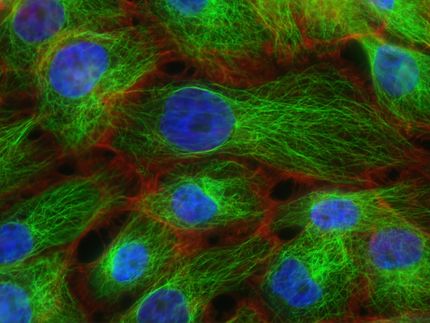Kill resistant tumor cells
Advertisement
Researchers from the University of Pittsburgh cancer Institute (UPCI), a partner with UPMC CancerCenter, have found that an agent that inhibits mitochondrial division can overcome tumor cell resistance to a commonly used cancer drug, and that the combination of the two induces rapid and synergistic cell death. Separately, neither had an effect.
"In our earlier work, we found that blocking production of a protein called Drp1 stopped mitochondria, known as the powerhouses of the cell, from undergoing fission, which is necessary for the cellular division process called mitosis," said Bennett Van Houten, Ph.D., the Richard M. Cyert Professor of Molecular Oncology, Pitt School of Medicine, and leader of UPCI's Molecular and Cell Biology Program. "The loss of this critical mitochondrial protein caused the cells to arrest in mitosis and to develop chromosomal errors, and eventually led the tumor cell into the cell death pathway known as apoptosis."
The researchers blocked Drp1 in breast cancer cell lines with an agent called mitochondrial division inhibitor-1 (mdivi-1) and found that when mdivi-1 and the cancer drug cisplatin were given together, they caused DNA damage, DNA replication stress, and greater than expected apoptosis rates. The synergistic drug combination acted through two independent biochemical pathways that caused the mitochondrial membrane to swell, increasing its permeability and allowing the leak of chemical signals that trigger apoptosis.
"Cisplatin is one of the most widely used cancer drugs today, but some tumors are inherently resistant to it, and many others become resistant, leading to treatment failure," Dr. Van Houten said. "In our studies, this combination overcame cisplatin resistance and caused cancer cell death, which is very encouraging."
The team is testing the regimen's effectiveness in a mouse model of ovarian cancer, a disease that often recurs and no longer responds to cisplatin treatment.
Most read news
Topics
Organizations
Other news from the department science

Get the life science industry in your inbox
By submitting this form you agree that LUMITOS AG will send you the newsletter(s) selected above by email. Your data will not be passed on to third parties. Your data will be stored and processed in accordance with our data protection regulations. LUMITOS may contact you by email for the purpose of advertising or market and opinion surveys. You can revoke your consent at any time without giving reasons to LUMITOS AG, Ernst-Augustin-Str. 2, 12489 Berlin, Germany or by e-mail at revoke@lumitos.com with effect for the future. In addition, each email contains a link to unsubscribe from the corresponding newsletter.




















































